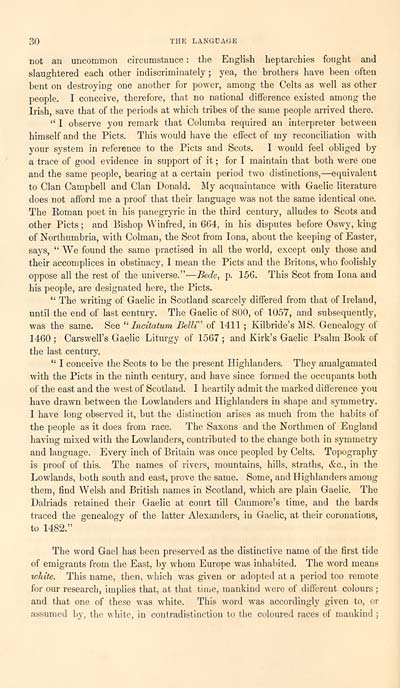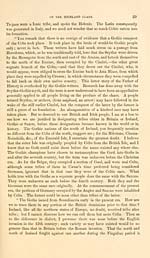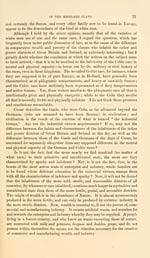Download files
Complete book:
Individual page:
Thumbnail gallery: Grid view | List view

30 THE LANGUAGE
not an uncommon circumstance : the English heptarchies fought and
slaughtered each other indiscriminately ; yea, the brothers have been often
bent on destroying one another for power, among the Celts as well as other
people. I conceive, therefore, that no national difference existed among the
Irish, save that of the periods at which tribes of the same people arrived there.
" I observe you remark that Columba required an interpreter between
himself and the Picts. This would have the effect of my reconciliation with
your system in reference to the Picts and Scots. I would feel obliged by
a trace of good evidence in support of it ; for I maintain that both were one
and the same people, bearing at a certain period two distinctions, — equivalent
to Clan Campbell and Clan Donald. My acquaintance with Gaelic literature
does not afford me a proof that their language was not the same identical one.
The Roman poet in his panegryric in the third century, alludes to Scots and
other Picts ; and Bishop VVinfred, in 664, in his disputes before Oswy, king
of Northumbria, with Colmau, the Scot from lona, about the keeping of Easter,
saj's, " We found the same practised in all the world, except only those and
their accomplices in obstinacy, I mean the Picts and the Britons, who foolishly
oppose all the rest of the universe."— ^efZe, p. 156. This Scot from lona and
his people, are designated here, the Picts.
" The writing of Gaelic in Scotland scarcely differed from that of Ireland,
until the end of last century. The Gaelic of 800, of 1057, and subsequently,
was the same. See " Incitatum Belli" of 1411 ; Kilbride's MS. Genealogy of
1460 ; Carswell's Gaelic Liturgy of 1567 ; and Kirk's Gaelic Psalm Book of
the last century.
" I conceive the Scots to be the present Highlanders. They amalgamated
with the Picts in the ninth century, and have since formed the occupants both
of the east and the west of Scotland. I heartily admit the marked difil'erence you
have drawn between the Lowlanders and Highlanders in shape and sj'mmetry.
I have long observed it, but the distinction arises as much from the habits of
the people as it does from race. The Saxons and the Northmen of England
having mixed with the Lowlanders, contributed to the change both in symmetry
and language. Every inch of Britain was once peopled by Celts. Topography
is proof of this. The names of rivers, mountains, hills, straths, &c., in the
Lowlands, both south and east, prove the same. Some, and Highlanders among
them, find Welsh and British names in Scotland, which are plain Gaelic. The
Dalriads retained their Gaelic at court till Canmore's time, and the bards
traced the genealogy of the latter Alexanders, in Gaelic, at their coronations,
to 1482."
The word Gael has been preserved as the distinctive name of the first tide
of emigrants from the East, by whom Europe was inhabited. The word means
white. This name, then, which was given or adopted at a period too remote
for our research, implies that, at that time, mankind were of different colours ;
and that one of these was white. This word was accordingly given to, or
assumed by, the white, in contradistinction to the coloured races of mankind ;
not an uncommon circumstance : the English heptarchies fought and
slaughtered each other indiscriminately ; yea, the brothers have been often
bent on destroying one another for power, among the Celts as well as other
people. I conceive, therefore, that no national difference existed among the
Irish, save that of the periods at which tribes of the same people arrived there.
" I observe you remark that Columba required an interpreter between
himself and the Picts. This would have the effect of my reconciliation with
your system in reference to the Picts and Scots. I would feel obliged by
a trace of good evidence in support of it ; for I maintain that both were one
and the same people, bearing at a certain period two distinctions, — equivalent
to Clan Campbell and Clan Donald. My acquaintance with Gaelic literature
does not afford me a proof that their language was not the same identical one.
The Roman poet in his panegryric in the third century, alludes to Scots and
other Picts ; and Bishop VVinfred, in 664, in his disputes before Oswy, king
of Northumbria, with Colmau, the Scot from lona, about the keeping of Easter,
saj's, " We found the same practised in all the world, except only those and
their accomplices in obstinacy, I mean the Picts and the Britons, who foolishly
oppose all the rest of the universe."— ^efZe, p. 156. This Scot from lona and
his people, are designated here, the Picts.
" The writing of Gaelic in Scotland scarcely differed from that of Ireland,
until the end of last century. The Gaelic of 800, of 1057, and subsequently,
was the same. See " Incitatum Belli" of 1411 ; Kilbride's MS. Genealogy of
1460 ; Carswell's Gaelic Liturgy of 1567 ; and Kirk's Gaelic Psalm Book of
the last century.
" I conceive the Scots to be the present Highlanders. They amalgamated
with the Picts in the ninth century, and have since formed the occupants both
of the east and the west of Scotland. I heartily admit the marked difil'erence you
have drawn between the Lowlanders and Highlanders in shape and sj'mmetry.
I have long observed it, but the distinction arises as much from the habits of
the people as it does from race. The Saxons and the Northmen of England
having mixed with the Lowlanders, contributed to the change both in symmetry
and language. Every inch of Britain was once peopled by Celts. Topography
is proof of this. The names of rivers, mountains, hills, straths, &c., in the
Lowlands, both south and east, prove the same. Some, and Highlanders among
them, find Welsh and British names in Scotland, which are plain Gaelic. The
Dalriads retained their Gaelic at court till Canmore's time, and the bards
traced the genealogy of the latter Alexanders, in Gaelic, at their coronations,
to 1482."
The word Gael has been preserved as the distinctive name of the first tide
of emigrants from the East, by whom Europe was inhabited. The word means
white. This name, then, which was given or adopted at a period too remote
for our research, implies that, at that time, mankind were of different colours ;
and that one of these was white. This word was accordingly given to, or
assumed by, the white, in contradistinction to the coloured races of mankind ;
Set display mode to: Large image | Transcription
Images and transcriptions on this page, including medium image downloads, may be used under the Creative Commons Attribution 4.0 International Licence unless otherwise stated. ![]()
| Early Gaelic Book Collections > Blair Collection > Treatise on the language, poetry, and music of the Highland clans > (42) |
|---|
| Permanent URL | https://digital.nls.uk/76236865 |
|---|
| Description | A selection of books from a collection of more than 500 titles, mostly on religious and literary topics. Also includes some material dealing with other Celtic languages and societies. Collection created towards the end of the 19th century by Lady Evelyn Stewart Murray. |
|---|
| Description | Selected items from five 'Special and Named Printed Collections'. Includes books in Gaelic and other Celtic languages, works about the Gaels, their languages, literature, culture and history. |
|---|

